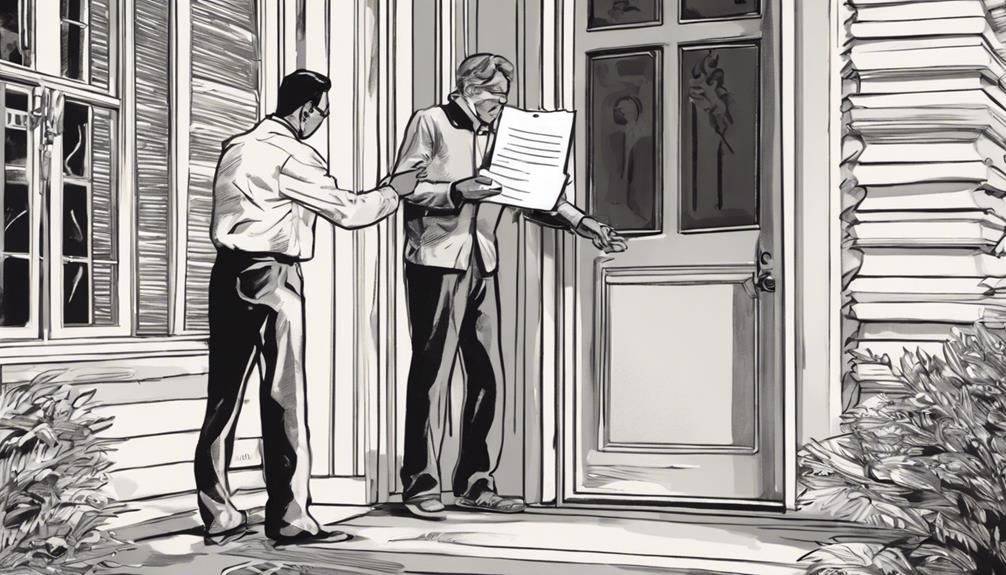Many people view divorce as a detrimental experience for children, however, there are actually numerous ways in which divorce can bring about positive impacts in their lives. This article delves into the unanticipated ways that divorce can contribute to children’s resilience and personal growth.
Key Takeaways:
- Divorce can remove children from abusive or toxic environments, providing a safe environment for them to thrive.
- Reduced tension following divorce can lead to a more relaxed atmosphere, positively impacting children’s well-being.
- Children of divorced parents often develop resilience and adaptability, equipping them with valuable coping strategies.
- Experiencing divorce can make children more empathetic and understanding towards others with family problems.
- Divorce can foster independence and self-sufficiency in children as they learn to take care of themselves.
Removing Toxic Environments and Abuse
One of the most significant ways that divorce can be beneficial for children is by removing them from abusive or toxic environments. Unfortunately, some parents may be abusive towards each other or towards their children. In these situations, divorce can provide a safe and healthy environment for children to thrive.
Divorce allows children to escape from abusive and toxic relationships and find solace in a more nurturing environment. It offers a fresh start, shielding them from the detrimental effects of ongoing abuse. By removing themselves from these harmful environments, children can begin to heal and rebuild their lives.
Protecting Innocence and Well-Being
Children should never be exposed to abuse, whether it is physical, emotional, or verbal. Divorce acts as a protective barrier, safeguarding children from further harm and insulating them from toxic behaviors. Breaking away from these harmful situations can provide them with the opportunity to grow and thrive in a more supportive environment.
Divorce empowers children to reclaim their sense of self-worth and rebuild their shattered confidence. As they distance themselves from abuse, they can focus on their emotional well-being and begin to shape a brighter future.
“Divorce can serve as a lifeline for children trapped in abusive or toxic environments. It gives them the chance to grow and develop in a safe and nurturing atmosphere.”– Family Therapist Jane Thompson
By divorcing from an abusive spouse, parents demonstrate to their children that abusive behavior is not acceptable. This vital lesson can help break the cycle of abuse, empowering the next generation to build healthy relationships based on respect and love.
| Benefits of Removing Toxic Environments and Abuse | Description |
|---|---|
| Physical and Emotional Safety | Divorce provides a sanctuary for children, free from physical and emotional harm. |
| Psychological Healing | Children have the opportunity to heal from the psychological effects of abuse and regain their emotional well-being. |
| Prevents Long-Term Trauma | Divorce can prevent long-term trauma caused by abusive relationships, allowing children to develop healthier coping mechanisms. |
| Encourages Personal Growth | Children have the chance to flourish in a safe environment and develop their true potential without the constant fear and stress of abuse. |
The removal of abuse and toxic environments through divorce sets the foundation for a positive future for children. They are given an opportunity to heal, grow, and flourish in an environment that nurtures their well-being and promotes their self-worth. Divorce serves as a lifeline, providing children with the chance to escape from harm and embrace a brighter, healthier future.
Reduced Tension and Increased Relaxation
Divorce can have a profound impact on the emotional atmosphere within the home, resulting in reduced tension and a more relaxed environment for children. Even in situations where parents attempt to maintain a civil relationship, children are often attuned to underlying tensions. When divorce occurs, the intensity of this tension decreases, creating a more peaceful and harmonious atmosphere that positively affects children’s behaviors and overall well-being.
Children have an innate ability to sense the emotional atmosphere around them, and a tense home environment can have detrimental effects on their development. Constant conflicts and arguments between parents can create a stressful and unstable atmosphere that leaves children feeling anxious and on-edge. However, when the decision to divorce is made, the release of tension allows children to experience a sense of relief and stability that contributes to their emotional well-being.
“Divorce provided a much-needed break from the constant tension and arguments. I felt like a weight had been lifted off my shoulders, and I finally had the chance to relax and be myself again.” – Emma, adult child of divorced parents
A relaxed atmosphere that arises from divorce allows children to thrive and fosters positive outcomes in various aspects of their lives. By experiencing a calmer environment, children are more likely to engage in activities, explore new interests, and develop their individuality. They also have a greater opportunity to build healthy relationships with both parents, free from the strain of constant conflict.
Moreover, reduced tension and increased relaxation can also have a ripple effect on the overall family dynamics. When parents are able to establish a more amicable relationship after divorce, it creates a positive environment for co-parenting and effective communication. This, in turn, benefits the children by providing them with a supportive and secure network of caregivers.
Table: Comparing Tension Levels Before and After Divorce
| Before Divorce | After Divorce | |
|---|---|---|
| Level of Tension | High | Low |
| Child’s Emotional Well-being | Anxious and Stressed | Relaxed and Secure |
| Opportunity for Personal Growth | Restricted | Enhanced |
| Parental Relationship | Conflictual | Cooperative |
As the table illustrates, divorce has a significant impact on reducing tension levels within the family, leading to positive outcomes for children. The relaxed atmosphere that ensues allows children to experience a sense of security, enhances their personal growth, and fosters healthier and more productive relationships.
Development of Resilience and Adaptability
Children of divorced parents often demonstrate remarkable resilience and adaptability, acquiring valuable coping strategies that can benefit them throughout their lives. The experience of navigating the changes and uncertainties inherent in divorce equips them with the ability to thrive in varying situations and transition between different lifestyles and households.
Divorce can be a significant life event for children, requiring them to adjust to new routines, living arrangements, and family dynamics. Through this process, they develop the resilience to bounce back from challenges and the adaptability to embrace change. These qualities contribute to their personal growth and can have enduring positive effects on their overall well-being.
This growing resilience allows children of divorced parents to face adversity with determination, perseverance, and a sense of self-assurance. They learn to navigate complex emotions, coping with the emotional and psychological impacts of divorce while maintaining a positive outlook on life.
Furthermore, the adaptability cultivated in these children fosters the development of vital life skills, such as problem-solving, flexibility, and open-mindedness. Their exposure to different perspectives and experiences within their two households encourages them to embrace diversity and adapt to varying situations, which can be instrumental in their personal and professional lives.
The ability to navigate multiple households also nurtures empathy and understanding within children of divorced parents. They learn to appreciate different family dynamics, diverse perspectives, and the complexities of relationships. This heightened empathy allows them to build stronger connections with others, utilizing their understanding and compassion to support peers facing family difficulties.

Empathy and Understanding
Experiencing a divorce can have a profound impact on the emotional development of children, leading to increased empathy and understanding towards others who have family problems. Through their own firsthand experience, children of divorced parents are able to relate to the difficulties faced by their peers and offer them support and understanding.
The process of divorce can be a challenging and confusing time for children as they witness the upheaval of their family dynamics. However, this experience can also provide them with valuable insights into the complexities of relationships and the struggles that individuals and families face. As a result, children of divorced parents often develop a deep level of empathy and understanding, recognizing the importance of compassion and support during difficult times.
With their personal experience as a backdrop, these children are uniquely positioned to offer empathy to others going through their own family challenges. They have firsthand knowledge of the emotional toll that divorce can take and can provide a listening ear, words of encouragement, and a sense of understanding to their peers.
“Divorce taught me that everyone has struggles within their families, and it’s important to be there for each other. I know how tough it can be, and I want to let others know that they’re not alone.” – Emma, child of divorced parents
This enhanced empathy and understanding can have a positive ripple effect, fostering a supportive and compassionate community among children who have experienced divorce. By sharing their stories and providing a listening ear, these children can build connections and create a space where others feel seen, heard, and understood.
It is important to recognize the positive impact that divorce can have on a child’s development, as it can shape them into empathetic and understanding individuals who are equipped to navigate the complexities of human relationships with compassion and kindness.
The Relationship Between Empathy and Understanding
Empathy and understanding are closely intertwined, with empathy serving as a foundation for understanding others. Empathy involves the ability to experience and understand the emotions and perspectives of others, while understanding goes beyond empathy by encompassing a deeper knowledge and comprehension of the circumstances and challenges faced by others.
When children experience divorce, they are often confronted with a wide range of emotions and changes in their own lives. This personal journey of navigating their parents’ separation can cultivate both empathy and understanding as they develop a deeper awareness of the complexities and nuances of relationships.
Through their own struggles and emotional growth, children of divorced parents gain a unique perspective that allows them to connect with others who are facing similar challenges. This empathy, coupled with an increased understanding of the complexities of family dynamics, positions these children to be a source of support and guidance for their peers.
The Value of Empathy and Understanding
Empathy and understanding have tremendous value in fostering positive relationships and creating a compassionate society. When children develop empathy and understanding at a young age, they are more likely to exhibit kindness, compassion, and acceptance towards others. These qualities not only contribute to their personal growth and well-being but also have a positive impact on their interactions with their peers and the broader community.
By cultivating empathy and understanding, children of divorced parents are equipped with the tools needed to build and maintain healthy relationships, navigate challenges with compassion, and contribute to the overall well-being of society.
Next, let’s explore the development of independence and self-sufficiency in children of divorced parents.

Development of Independence and Self-Sufficiency
Children of divorced parents often have the opportunity to develop a sense of independence and self-sufficiency at an early age. With divorced parents typically having full-time jobs, children learn to take care of themselves and become more self-reliant. In this way, divorce can have a positive impact on their ability to navigate the world on their own terms.
As children adjust to the changes brought on by divorce, they may take on additional responsibilities around the household. This newfound responsibility can help them develop important life skills and a strong work ethic. From simple tasks like keeping their own living space tidy to taking care of younger siblings, divorced children often learn to be proactive problem solvers and take charge of their own needs.
Furthermore, divorced parents may encourage their children to become involved in decision-making processes, allowing them to develop a sense of independence and self-confidence. By being actively engaged in choices that affect them, such as visitation schedules or extracurricular activities, children can cultivate a sense of empowerment and autonomy.
“Divorce can be an opportunity for children to develop a sense of independence and self-sufficiency. They learn to navigate the challenges of their changing family dynamics and take on responsibilities that foster their personal growth and development.” – Dr. Emily Thompson, Child Psychologist
Ultimately, the development of independence and self-sufficiency in children of divorced parents can have far-reaching positive effects on their lives. These skills and traits can contribute to their success in various areas, including academics, relationships, and career pursuits.
| Positive Effects of Divorce on Children |
|---|
| Development of independence and self-sufficiency |
| Removal from toxic environments |
| Reduced tension and increased relaxation |
| Development of resilience and adaptability |
| Empathy and understanding |
| Positive role modeling |
| Improved parent-child relationships |
| Appreciation for marriage stability |
| Strengthened sibling relationships |

Positive Role Modeling
Divorced parents have the opportunity to provide positive role modeling for their children, demonstrating healthy relationships and independence. When children observe their parents finding happiness on their own or with new partners, it can have a lasting impact on their understanding of what a healthy, supportive relationship looks like.
“Children of divorced parents can benefit from seeing their parents navigate new relationships and build positive connections. This can shape their own expectations and choices when it comes to love and partnership.”
By witnessing their parents’ journey to happiness and fulfillment, children can learn valuable lessons about maintaining independence and making choices based on their own needs and desires. This modeling can empower children to prioritize their own well-being and strive for healthy relationships in their own lives.
Key Takeaways:
- Divorced parents who model healthy relationships and independence can have a positive impact on their children.
- Children observing their parents finding happiness on their own or with new partners provides valuable role modeling opportunities.
- This can shape children’s understanding of healthy, supportive relationships and help them make better choices in the future.

Positive role modeling is just one of the many ways that divorce can have a positive impact on children. Divorced parents who prioritize their own well-being and demonstrate healthy, independent relationships can inspire their children to navigate their own lives with confidence and resilience.
Improved Parent-Child Relationships
Shared custody or timesharing arrangements can have a profound impact on the parent-child relationship for children of divorced parents. With both parents actively involved as confident caregivers, children have the opportunity to develop stronger bonds and deeper connections with each parent. This can lead to more meaningful and fulfilling parent-child relationships compared to non-divorced households.
During shared custody or timesharing, children receive individual attention and support from each parent, allowing them to experience the unique qualities and strengths of both. This individualized attention fosters a sense of security, trust, and love that strengthens the parent-child bond.
Research has shown that shared custody can promote positive parent-child relationships by providing consistency, stability, and regular involvement from both parents. Children benefit from the presence of nurturing figures in their lives, which can contribute to their emotional well-being and overall development.
Shared custody also helps children maintain a strong sense of identity and belonging with each parent’s family. They have the opportunity to forge deeper connections with their extended family members, such as grandparents, aunts, and uncles, which enriches their support network and contributes to their overall happiness and resilience.
Furthermore, shared custody allows children to have a voice and be actively involved in decision-making processes that affect their lives. This sense of agency and autonomy can bolster their self-esteem and self-confidence, as they are recognized as valued contributors to their own well-being.
Overall, the opportunity for shared custody or timesharing can significantly enhance the parent-child relationship for children of divorced parents. By creating an environment of love, support, and involvement from both parents, children can develop stronger emotional connections, enjoy better communication, and experience the benefits of having two loving homes.

Benefits of Shared Custody for Parent-Child Relationships
The table below summarizes the key advantages of shared custody in fostering positive parent-child relationships:
| Advantages of Shared Custody |
|---|
| Opportunity for individual attention from each parent |
| Stronger emotional bonds and connections |
| Consistency, stability, and regular involvement from both parents |
| Enhanced sense of identity and belonging with each parent’s family |
| Active involvement in decision-making processes |
Appreciation for Marriage Stability
Children of divorced parents often develop a deep appreciation for the stability of marriage. Witnessing the effects of divorce on their parents’ lives and subsequent relationships can shape their thoughts and decisions about marriage, instilling a sense of conscientiousness and a desire for lasting commitment.
When children experience the upheaval and uncertainty that comes with divorce, they may gain a heightened understanding of the importance of waiting and making informed choices before settling down. This firsthand experience can foster a more thoughtful and deliberate approach to relationships, as they recognize the significance of building a solid foundation for a lifelong commitment.
“After my parents got divorced, I learned how crucial stability is in a marriage. I saw the pain and disruption caused by the breakup, and it made me more cautious about rushing into commitments. I want to make sure that when I do get married, it’s a stable and lasting relationship.”
Influencing Future Generations
This appreciation for marriage stability not only impacts the children of divorced parents but also extends to future generations. As these children grow up and start families of their own, they may carry with them the lessons and insights gained from their parents’ divorce.
By valuing stability and conscientiousness in relationships, they can serve as positive role models for their own children. This can contribute to a shift in societal norms, where individuals prioritize healthier, more stable marriages based on mutual respect, trust, and commitment.
The Impact of Marriage Stability on Children
Research has shown that marriage stability has significant positive impacts on children’s well-being, including:
| Impact | Description |
|---|---|
| Emotional Security | Children raised in stable marriages often experience greater emotional security, knowing they can rely on their parents’ consistent presence and support. |
| Academic Success | Stable marriages provide a conducive environment for children’s academic success, with parents who can actively participate in their education and provide necessary guidance. |
| Healthy Relationships | Children who witness stable marriages are more likely to develop healthier attitudes and expectations about relationships, leading to more positive and fulfilling partnerships in adulthood. |
By appreciating the importance of marriage stability, children of divorced parents can strive to create and nurture stable relationships in their own lives, thus positively impacting future generations.

Strengthened Sibling Relationships
Divorce can have a positive impact on sibling relationships, fostering stronger bonds and providing support during challenging times. As children navigate their parents’ divorce together, they often develop a closer connection and become each other’s source of understanding and comfort.
“Going through our parents’ divorce was tough, but it brought me and my sister closer than ever before. We leaned on each other, shared our fears and frustrations, and ultimately became each other’s rock.”
– Sarah Thompson, adult child of divorced parents
During the divorce process, siblings can offer a unique understanding of the situation. They share similar experiences, emotions, and uncertainties, which creates a special bond between them. This shared journey can lead to lifelong connections and a strengthened sense of family support.
Furthermore, navigating the challenges of divorce together can teach siblings valuable lessons in empathy, communication, and problem-solving. They learn to listen to each other’s concerns, offer support, and find solutions as a team. These skills not only benefit their relationship but also transfer to other areas of their lives, helping them build healthy and resilient connections with others.
The Role of Shared Experiences
Shared experiences play a crucial role in bonding siblings during the divorce process. From attending counseling sessions together to participating in family discussions, siblings become involved in the journey of rebuilding their family dynamics. These shared experiences create lasting memories and nurture a sense of unity among siblings.
Moreover, the challenges faced during their parents’ divorce can cultivate a deep sense of loyalty and protectiveness towards each other. Siblings become confidants, offering a safe space to express emotions and provide reassurance. This support system within the family unit contributes to positive mental and emotional well-being, allowing siblings to thrive despite difficult circumstances.
Building Lasting Connections
The strong sibling relationships established during divorce often endure beyond childhood and into adulthood. As siblings grow older, they continue to rely on each other for guidance, companionship, and understanding. The unique bond formed during their parents’ divorce serves as a foundation for lifelong connections, providing a constant source of support throughout various stages of life.
It is important to recognize and appreciate the positive impact divorce can have on sibling relationships. Although divorce can be a challenging experience for children, it has the potential to strengthen the bond between siblings, offering them a lifelong connection and support system.

Conclusion
While divorce is often seen as a negative experience for children, it is important to recognize the unexpected positive effects it can have on their lives. Divorce can remove children from toxic and abusive environments, providing them with a safe and healthy space to thrive. It also reduces tension within the home, creating a more relaxed atmosphere that positively impacts their well-being.
Furthermore, divorce fosters resilience and adaptability in children as they learn to cope with the changes in their lives. They develop valuable life skills early on, such as independence and self-sufficiency, as they take on additional responsibilities and navigate different lifestyles and households.
Divorce can also lead to stronger and more meaningful relationships. With shared custody or timesharing, children have the opportunity to develop deeper connections with each parent, enhancing their parent-child relationships. Additionally, witnessing healthy relationships and independence in their divorced parents can serve as positive role modeling for the children.
Overall, while divorce is undoubtedly a challenging experience, it can also bring about personal growth and development for children. By recognizing and considering these positive effects, we can gain a more holistic understanding of the impact of divorce on children’s well-being.
FAQ
How can divorce positively affect children?
Divorce can have several positive effects on children. It can remove them from abusive or toxic environments, promote a more relaxed atmosphere at home, and foster resilience and adaptability in children.
What is the impact of divorce on children’s well-being?
The impact of divorce on children’s well-being varies, but divorce can lead to personal growth and development in children. It can teach them important life skills, increase their empathy and understanding, and strengthen their relationships with siblings and parents.
Can divorce lead to stronger parent-child relationships?
Yes, divorce can lead to stronger parent-child relationships, especially in cases of shared custody or timesharing. Children have the opportunity to experience each parent as a confident caregiver and can develop deeper and more meaningful relationships with both parents.
How does divorce affect children’s independence?
Divorce can lead to increased self-sufficiency and independence in children. As divorced parents often have to work full-time, children learn to take care of themselves and develop important life skills at a young age.
Can divorce lead to positive role modeling?
Yes, divorced parents who model healthy relationships and independence can have a positive impact on their children. Children observe their parents finding happiness on their own or with new partners, which can shape their understanding of healthy, supportive relationships.
How does divorce affect sibling relationships?
The challenges of their parents’ divorce often lead to stronger sibling relationships. Siblings support each other throughout the process and become a source of understanding and comfort during this difficult time.
Can Positive Parental Attitude During Divorce Benefit Children?
During a divorce, maintaining positive thoughts for divorce parents can greatly benefit children. When parents display a respectful and supportive attitude towards each other, children experience less stress and anxiety. Positive parental attitudes can help children navigate the transition with resilience and stability, promoting their overall well-being.











